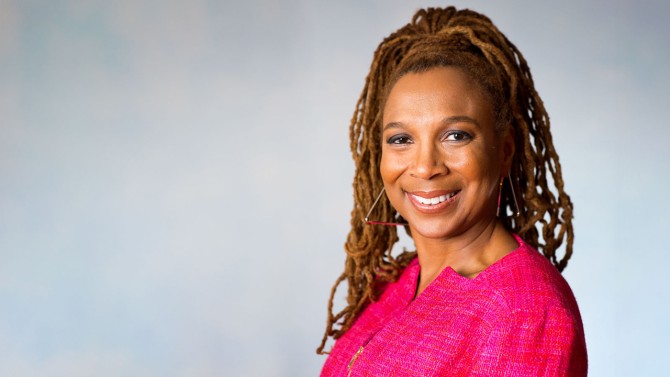Scholar to speak on intersectional justice at annual MLK lecture
By Laura Gallup
This year’s Martin Luther King, Jr. Commemorative Lecture will focus on the importance of understanding and addressing systems of oppression and their impact on multiple identities, including race and gender.
Kimberlé Crenshaw ’81, professor of law at the University of California, Los Angeles Law School and at Columbia Law School, will speak at the event, “The Urgency of Intersectional Justice” on Feb. 19 at 7 p.m. in Sage Chapel.
Crenshaw is a pioneering scholar and writer on civil rights, critical race theory, Black feminist legal theory, race, racism and the law. Crenshaw’s work has been foundational in critical race theory and in intersectionality, both terms she coined. She is also known for raising awareness about police violence against Black women through her work with the #SayHerName campaign.
“Throughout her career, Crenshaw has made visible the often-invisible oppression of women of color, and now we are seeing escalating efforts across the country to ban this vital work,” said Joel Harter, director of the Office of Spirituality and Meaning-Making and one of the event’s organizers. “The committee selected Crenshaw as a champion for DEI and to signal that free expression and academic freedom include the researching and teaching about past and ongoing oppression.”
Crenshaw’s work challenges society to recognize that working toward King’s vision requires advancing justice and civil rights at the intersection of race and gender. The 2024 Commemorative Lecture is part of the yearlong celebration of the 50th anniversary of the Women’s Resource Center at Cornell, recently renamed the Gender Equity Resource Center, and celebrates Crenshaw’s lifelong efforts as a leading advocate and educator for gender justice. This year’s talk also highlights the work of the newly renamed Centers for Student Equity, Empowerment, and Belonging within the Office of the Dean of Students.
“The theory of intersectionality is empowering on an individual level because it captures that our experiences of identity happen at the intersections within a larger system,” said Shura Gat, director of the Gender Equity Resource Center. “To be seen, for example, as both Black and a woman, is powerful in that it acknowledges that these two identities are inextricably linked.”Following the keynote, Riché Richardson, professor in the Africana Studies and Research Center, in the College of Arts and Sciences, will lead a conversational Q&A. In-person attendees are required to register ahead of time to ensure seating. The event will also be available via livestream, with a recording accessible to those who register for the livestream.
The annual Martin Luther King, Jr. Commemorative Lecture at Cornell aspires to be a cross-campus and community partnership that makes accessible the life and legacy of King for contemporary times. The event is sponsored by the Centers for Student Equity, Empowerment, and Belonging; Office of Spirituality and Meaning-Making Gender Equity Resource Center; Gender Justice Advocacy Coalition; LGBT Resource Center; Office of Academic Diversity Initiatives; Greater Ithaca Activity Center; Asian and Asian American Center; Black Student Empowerment; Center for Racial Justice and Equitable Futures; Cornell Law School; College of Architecture, Art and Planning; CALS Diversity and Inclusion; John Henrik Clarke Africana Library; and the Interfaith Council at Cornell.
Listen to a recent interview with Kimberlé Crenshaw on "All Things Equal" here.
Laura Gallup is a communications lead in Student and Campus Life.
Media Contact
Get Cornell news delivered right to your inbox.
Subscribe

